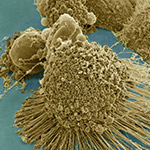Total Smoking Bans Work Best
Completely banning tobacco use inside the home – or more broadly in the whole city – measurably boosts the odds of smokers either cutting back or quitting entirely.
Completely banning tobacco use inside the home – or more broadly in the whole city – measurably boosts the odds of smokers either cutting back or quitting entirely.

The UC San Diego Center for Mindfulness has launched a WorkLife Integration Program for companies that would like to help their employees reduce stress, increase focus and improve productivity. The convenient in-house training program is designed for companies of all sizes and for employees of all organizational levels.

Down syndrome (DS) is a childhood condition but improved health care means that individuals with DS now routinely reach age 50 or 60 years of age, sometimes beyond. However, if they live long enough, people with Down syndrome are almost certain to develop Alzheimer’s disease.

A network of 25 nationally recognized stroke centers has been created to rapidly address the three core features of stroke research and care: prevention, treatment and recovery. The regional coordinating centers (RCCs), working with nearby satellite facilities, will span the country and have teams of researchers representing every stroke-related medical specialty, with the primary goal of bringing new therapies and strategies to the stroke community more rapidly.

Researcher Thomas J. Kipps, MD, PhD, professor of medicine and deputy director of research operations at UC San Diego Moores Cancer Center, is principal investigator for one of six “Disease Team” awards approved December 12 by the governing board of the California Institute for Regenerative Medicine (CIRM).

In a novel study of U.S. Marines investigating the association between traumatic brain injury and the risk of post-traumatic stress disorder over time, a team of scientists led by researchers from the Veterans Affairs San Diego Healthcare System and University of California, San Diego School of Medicine report that TBIs suffered during active-duty deployment to Iraq and Afghanistan were the greatest predictor for subsequent PTSD, but found pre-deployment PTSD symptoms and high combat intensity were also significant factors.

Keep up with all the latest from UC San Diego. Subscribe to the newsletter today.
You have been successfully subscribed to the UC San Diego Today Newsletter.